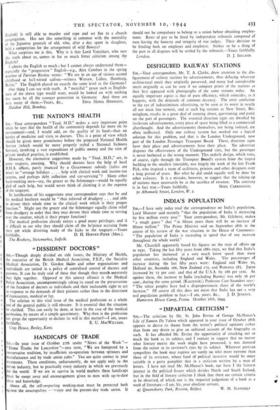IMPARTIAL CRITICISM "
Sta,—The criticism by Mr. St. John Ervine of George McManus's Life of Eamon De Valera which appeared in your issue of October 28th appears to derive its theme from the writer's political opinions rather than from any desire to give an unbiased account of the biography as such. It has afforded Mr. Ervine the opportunity of attacking not so much the book as its subject, and I venture to suggest that no matter what literary merits the work might have possessed, it was damned from the outset in its reviewer's eyes by its subject. Whatever partisan sympathies the book may express are surely no whit more extreme than those of its reviewer, whose fund of political invective would be more suitable in a party pamphlet that in a criticism written by a man of letters. I have not read Mr. McManus's book, nor have I the faintest interest in the political fissure which divides North and South Ireland, but in the field of literary criticism I think that there are certain criteria to be observed, of which one is the impartial judgement of a book as a work of literature.—I am, Sir, your obedient servant,
45 Queensberry Park, Rosetta, Belfast. W. M. SCAMMEL


























 Previous page
Previous page